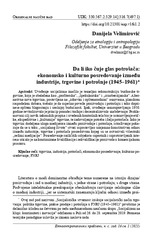Приказ основних података о документу
Is the Consumer's Voice Heard at All: Economic and Cultural Mediation Between Industry, Trade and Consumption (1945-1961)
| dc.creator | Velimirović, Danijela | |
| dc.date.accessioned | 2021-10-12T13:34:21Z | |
| dc.date.available | 2021-10-12T13:34:21Z | |
| dc.date.issued | 2021 | |
| dc.identifier.issn | 0353-1589 | |
| dc.identifier.uri | http://reff.f.bg.ac.rs/handle/123456789/3352 | |
| dc.description.abstract | The introduction of socialism entailed a fundamental reconstruction of bourgeois trade, which was labelled as "profiteering", "speculative" and "black marketeering". Alternative new trade, based on "sound and nationwide" foundations, was supposed to successfully link production and consumption through the planned distribution of goods, thus contributing to general prosperity and a happier future. However, the introduction of self-management in 1950 revitalized the principle of supply and demand and decentralized supply. The stated aim of the new regulations and the newly introduced control bodies was to establish ethical, efficient and "more civilized" trade, and to satisfy consumers' needs and wants. Although trade was assigned the role of mediator between production and consumption, research shows that in the course of the "social life" of things, a mutually constitutive relationship between industry, trade and consumers was being established, by means of which multiple "mediation regimes" were effectuated (Cronin 2004). While the first half of the 1950s was marked by trade interventions seeking to redefine the design and quality of manufactured goods, the second half of the decade saw a new departure. Industry, aided by designers as professional interpreters of consumer markets, sought to influence commercial buyers' choices with a new supply of goods aligned with consumers' wants. Through legislative acts which enabled the establishment of a consumers' council, direct mediation of consumers' needs and wants was also legitimized. These multidirectional cultural and economic mediations between industry, trade and the consumer were successful to a lesser or greater extent. Admittedly, in certain economic situations, both trade and industry used their capacity for blackmail to protect their guild interests. The hidden mechanisms of influence and power inhibited the mediating action of various actors and contributed to systemic confusion. However, it is indisputable that representatives of industry and trade as economic and cultural actors, together with consumers, sought to channel wants into economically presented forms of demand, and to gradually deconstruct the mechanisms of "dictatorship over needs" characteristic of socialist economies (Feher et al. 1986). | en |
| dc.publisher | Univerzitet u Beogradu - Filozofski fakultet - Odeljenje za etnologiju i antropologiju, Beograd | |
| dc.rights | openAccess | |
| dc.rights.uri | https://creativecommons.org/licenses/by/4.0/ | |
| dc.source | Etnoantropološki problemi | |
| dc.subject | trade | en |
| dc.subject | industry | en |
| dc.subject | Federal People's Republic of Yugoslavia | en |
| dc.subject | economic mediation | en |
| dc.subject | cultural mediation | en |
| dc.subject | consumers | en |
| dc.title | Is the Consumer's Voice Heard at All: Economic and Cultural Mediation Between Industry, Trade and Consumption (1945-1961) | en |
| dc.type | article | |
| dc.rights.license | BY | |
| dc.citation.epage | 72 | |
| dc.citation.issue | 1 | |
| dc.citation.other | 16(1): 49-72 | |
| dc.citation.rank | M24~ | |
| dc.citation.spage | 49 | |
| dc.citation.volume | 16 | |
| dc.identifier.doi | 10.21301/eap.v16i1.2 | |
| dc.identifier.fulltext | http://reff.f.bg.ac.rs/bitstream/id/1916/3349.pdf | |
| dc.identifier.wos | 000641561700002 | |
| dc.type.version | publishedVersion |

